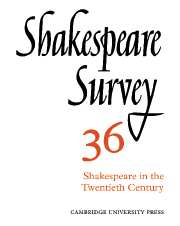Book contents
- Frontmatter
- Shakespeare and the Living Dramatist
- Blood and Wine: Tragic Ritual from Aeschylus to Soyinka
- Hamlet Andante/Hamlet Allegro: Tom Stoppard’s Two Versions
- Auden, Shakespeare, and the Defence of Poetry
- Graves on Lovers, and Shakespeare at a Lovers’ Funeral
- Tragic Balance in Hamlet
- Hamlet Across Space and Time
- Shakespeare’s Scripts and the Modern Director
- ‘He Shall Live a Man Forbid’: Ingmar Bergman’s Macbeth
- Komisarjevsky at Stratford-upon-Avon
- Troilus and Cressida and the Definition of Beauty
- The Pastoral Reckoning in Cymbeline
- New Created Creatures: Ralph Crane and the Stage Directions in The Tempest
- Arden of Faversham
- ‘Pickleherring’ and English Actors in Germany
- Shakespeare Performances in Stratford-upon-Avon and London, 1981–2
- The Year's Contributions to Shakespearian Study 1 Critical Studies
- 2 Shakespeare’s Life, Times and Stage
- 3 Textual Studies
- Index
- Plate Section
Troilus and Cressida and the Definition of Beauty
Published online by Cambridge University Press: 28 March 2007
- Frontmatter
- Shakespeare and the Living Dramatist
- Blood and Wine: Tragic Ritual from Aeschylus to Soyinka
- Hamlet Andante/Hamlet Allegro: Tom Stoppard’s Two Versions
- Auden, Shakespeare, and the Defence of Poetry
- Graves on Lovers, and Shakespeare at a Lovers’ Funeral
- Tragic Balance in Hamlet
- Hamlet Across Space and Time
- Shakespeare’s Scripts and the Modern Director
- ‘He Shall Live a Man Forbid’: Ingmar Bergman’s Macbeth
- Komisarjevsky at Stratford-upon-Avon
- Troilus and Cressida and the Definition of Beauty
- The Pastoral Reckoning in Cymbeline
- New Created Creatures: Ralph Crane and the Stage Directions in The Tempest
- Arden of Faversham
- ‘Pickleherring’ and English Actors in Germany
- Shakespeare Performances in Stratford-upon-Avon and London, 1981–2
- The Year's Contributions to Shakespearian Study 1 Critical Studies
- 2 Shakespeare’s Life, Times and Stage
- 3 Textual Studies
- Index
- Plate Section
Summary
The problem of how to define beauty is central to Troilus and Cressida. Shakespeare depicts Helen as incapable of acquiring symbolic stature and this creates in the play questions about the nature of beauty.
In the world of Troilus and Cressida beauty is defined by the beautiful woman, whether it be Helen or Cressida. But the idea of Helen as the archetype of beauty seems to have been challenged very early by shifts in perspective. The poet Stesichorus was legendary for a poem defaming Helen, for which the gods blinded him. He recanted and recovered, as Plato records in both The Republic and Phaedrus. Stesichorus' palinode asserted that the Helen story was a fabrication:
False, false the tale
Thou never didst sail in the well-decked ships
Nor come to the towers of Troy.
Dio Chrysostom, a first-century critic of Homer, declared that Homer was a beggar who told lies for a living and that the Judgement of Paris was an unlikely tale, in the first place because the 'consort of Zeus' would not have required Paris, a mere shepherd, to testify to her beauty, and secondly, because Helen was Aphrodite's sister, and the goddess would not have wished to disgrace her. Dio claims that Helen was lawfully married to Paris: 'If anyone does not accept this account under the influence of the old view, let him know that he is unable to get free of error and distinguish truth from falsehood.'
- Type
- Chapter
- Information
- Shakespeare Survey , pp. 85 - 96Publisher: Cambridge University PressPrint publication year: 1983
- 1
- Cited by



